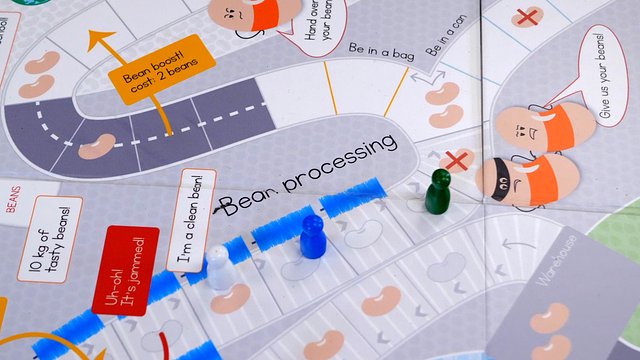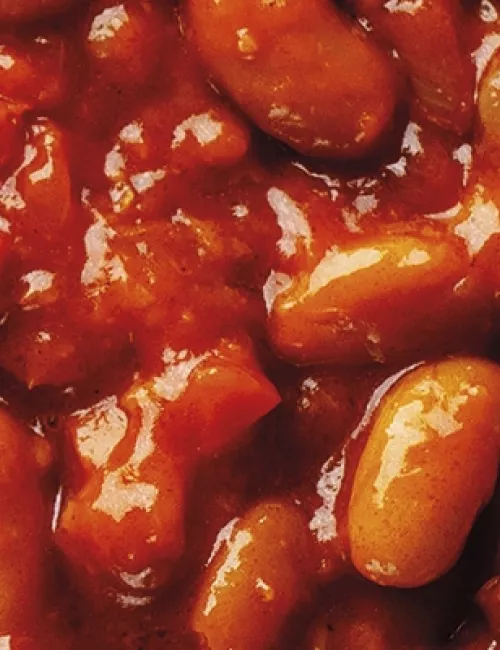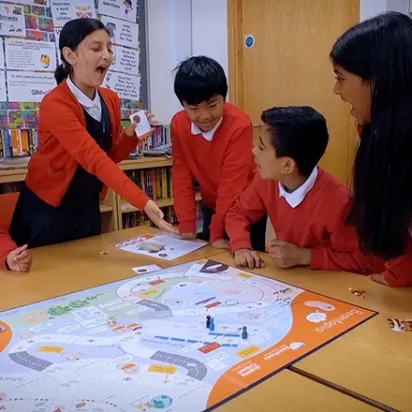How do we promote a healthier diet which has a lower environmental impact and also enhances local and national enterprise? By starting with the meal, the research works backwards through the supply chain to the grower. BeanMeals is therefore based on a ‘fork-to-farm’ concept – a reversal of the usual production-led ‘farm-to-fork’ model – and aims to establish how to enable the systemic innovations needed to transform food system outcomes. These systemic innovations require collaboration between multiple actors across the supply chain using systems approaches.
Promoting UK-grown beans in healthy school meals
Video transcript
BeanMeals is a research project and we're aiming to understand how we get more UK grown beans into our diets, and here we are in a school where we're working with the school caterers to have new formulations for school lunches to see how the children like the new recipes. The essence of the BeanMeals project is to think about the fork from farm journey that the beans will have taken to get onto the plates here in the school. Where did the school caterers get their beans from? How were those delivered? From where, what were the processes involved in cleaning the beans so they're fit for human consumption? How did those people get the beans from the farm? And so the story goes backwards from the plate to the farm.
Here we've got new varieties of common bean growing which are adapted to the lovely UK summer. We've got Godiva which is the new variety we're using in our BeanMeals project in schools. The dry bean crop is a summer crop which we sow in the second week of May and harvest in the first week of September. Now at their flowering stage they will be forming their associations with important bacteria, which means they can then fix their own nitrogen from the atmosphere. It takes about 100 days from sowing to harvesting and at that harvesting stage the beans will be completely dry and go straight into a combine harvester. We make sure the seed is clean so there's no bits of stones or other debris in there, and then it goes straight to the school kitchens.
Once the beans have left the field they start their journey to the plate. There are lots of opportunities for business – there's transport business, there's the processing business, there's the retailing. So there's a lot of research to be done based on the concept of the food system, and the food system is a way of describing all the processes that happen from fork to farm. And we're contributing to that research and knowledge base by using beans as a real example to help the health of the children but also to seek the alternative business opportunities along that supply chain.
We've had lessons with Year 5 in developing the Beantopia game and that's really interesting because that does show the process from the beans on the farm going through to actually on the plates. In terms of the work that we're doing in schools, we're looking at promoting a healthy diet using plant-based and promoting that there's alternatives as well as to having a meat diet, but also having them together as well. So it is about having that well-balanced healthy approach to food. And getting children to try foods as well that maybe they haven't tried before. So the children have enjoyed being part of the project, looking at where the beans are from and they've enjoyed then having a go at trying the beans as well.
We're really grateful for the support and encouragement from local schools like this, from the local community, Leicestershire County Council, Leicester city council and the various other non-academic partners we're working with. So I think going to the future, we hope to see a continuation of the effort and already we're picking up opportunities for collaboration with other projects, not only to see the agricultural benefit but also the benefit for diet and the benefit for local enterprise.
BeanMeals @ Home: cooking with dried beans
Video transcript
Bean meals is a research project and we want to understand how we get UK-grown beans into our diets. The beans that are part of the project have been bred at Warwick University and are adapted to growing in the UK climate.
Today we are using Godiva and Capulet beans from Warwick which are a dried bean crop.
During 2023 we've worked with 10 families from diverse communities across Leicester, really observing the barriers and opportunities for incorporating the Warwick-grown pulses into household diets. Some of our participants were already very familiar with eating and cooking dried pulses, but others – the only experience they'd had with beans was eating beans from a baked bean tin.
Before the cookery sessions we'd never used beans before but we've really enjoyed experimenting, haven't we, with different things?
I'm very familiar with cooking pulses and beans and at night I think in each house in India we must have dal and now people realise that pulses and beans are very good source of proteins.
Today I cooked using only two type of different beans, red and white. These are the UK-grown beans and we actually experimenting these two beans and they turned out to be perfect for the cooking. To me, is very important to cook food in the pressure cooker because it holds the goodness in It. Some people think that cooking beans is a long process but if you can cook them in the pressure cooker it lessens the time and I cook them in 10 minutes.
I'm very glad to have the opportunity of cooking these two kinds of beans. I've cooked so many dishes with these beans and they are fantastic.
We are all vegetarian so the way to get the protein in our diet is only source is beans and pulses so we use beans in our daily diet. With the tinned food, there is a lot of preservatives and that's what I try to avoid in my diet. I would prefer dry beans. It tastes different and also my parents always say is that there's more nutrition in the freshly cooked meal. I like to cook from scratch, so I always have my beans in my cupboards and now that you’ve introduced these beans I have those beans as well so I use that in my cooking.
We have a weekly set menu, Monday to Friday, that we're cooking. Because I know I'm making beans on Wednesday, I will soak them the day before so it's ready to cook next day and that's a much quicker way of cooking.
I think these beans were quite easy to cook as well, I just soaked them for a couple of hours and then cooked them in a pressure cooker; they were instantly cooked and I added a bit of mixed veg and and then rice and it was all ready.
Our research participants really gave us an insight into what households in Leicester are eating and everyone really wanted to know how to cook with beans, not just because they were an inexpensive source of protein and dietary fibre but also because they knew that they were nutritious.
Even those that were unfamiliar previously with cooking dried pulses, they showed real initiative creating meals that were tailored for their family's needs. And those familiar with cooking beans really gave us a masterclass into how to cook them efficiently.
All you need to do is think ahead, soak the beans for a couple of hours and it's very easy to cook. So, don't be afraid of cooking beans.
This household work is part of the bigger project where we've been doing research in six schools and also looking at the ‘missing middle’ of how we get the beans from the farm onto people's plates.
Simply adding beans to what we currently eat will give a balanced approach to our diet and so we're hoping that we'll be able to have healthy beans in everyone's diets.
My advice will be: nothing to worry about… easy peasy. Just try once, twice… The best way is to cook in a pressure cooker. It saved my time, saved energy and saved everybody else's hassle –it will be lovely to have it cooked for other people, ready to go on the table.
[ends]
Our work
Moderating consumption of foods that are high in fats, sugar and salt (HFSS) requires coordinated action across the food system. Our research will explore how to transform the food system based on systemic innovation in institutional catering and home-cooking by using healthier ingredients, new public procurement practices and more-local products.
Our research will feature meals made from two quick-cooking navy bean varieties which have recently been developed for UK growing conditions by the University of Warwick. The Capulet and Godiva beans are suitable for a wide range of easily-prepared institutional- and home-cooked meals with lower fat, salt and sugar content.
The production of Capulet is poised to scale-up with UK-based commercial partners. This will reduce the amount of dry navy beans (used in tinned baked beans) imported from North America, so lessening the environmental costs of shipping and opening new local enterprise opportunities.
The environmental benefits of increased production and consumption of UK bean-based meals include:
- Reduced fertilizer demand on subsequent crops: beans are a N-fixing rotation crop, leading to reduced GHG related to fertilizer manufacture, and reduced N2O emissions and runoff from agriculture
- Reduced water and energy use from more efficient processing – the beans cook quickly
- Reduced transport emissions from more local supply chains and lower importation of dry beans.
We aim to develop and analyse systemic innovations for reducing HFSS consumption in institutional and home-cooking by using UK-grown navy beans. Research will start with preparation and consumption of the meal, and work backwards though the ‘missing middle’ – the retailers/wholesalers, distributors, secondary and primary processors, and the associated logistics – to the grower. By crossing research disciplines with innovation topics in its research design, we will determine both how best to bring about systemic innovation, and analyse the health, environment and enterprise impacts of the transformed system.
Reports
Transforming school food for the better
This guide features tips for taking a whole-school approach when creating healthy and sustainable school menus that children enjoy. It covers procurement and outlines simple steps that schools can take independently to embed a healthier food culture in the curriculum and in the dining hall
Leicester City Council Compass Report
Working with our project partners at Leicester City Council, this report helps local stakeholders understand the value of systems thinking when tackling local food challenges. It provides a snapshot of how local food systems are performing and discussion points when taking steps to improve food system outcomes.
Leicestershire County Council Compass Report
Working with our project partners at Leicestershire County Council, this report helps local stakeholders understand the value of systems thinking when tackling local food challenges. It provides a snapshot of how local food systems are performing and discussion points when taking steps to improve food system outcomes.
Enhancing the Missing Middle: Pathways to scaling the value chain for British-grown beans
The report highlights the potential impacts of investment to boost the production and consumption of UK bean. These include a more sustainable and profitable agricultural system and healthier diets with a lower environmental impact. The authors outline three pathways for upscaling, examining each pathways barriers, enablers and outcomes. It also highlights which food system actors could pursue these routes.
Beans as a vehicle for transforming food system outcomes
Bringing together a vision for achieving the shift towards bean-rich diets, this report outlines case studies, key themes and next steps as discussed at the summit held on 27 to 28 September 2023 in Oxford.
Putting beans on the plate: Analysis of UK demand and supply of beans and plant-based proteins
This report describes UK demand and supply of plant-based alternatives to meat, for human consumption, and the role of beans. The aim is to provide a better understanding of the current and potential future demand for, and supply of, beans and how this fits into a broader shift to plant-based foods.
Beantopia game – download and play
This downloadable version of the BeanMeals Beantopia board game helps players learn about food system issues while following a bean’s journey from the field to the plate. There are notes for teachers including KS 2 curriculum links. Use the quiz cards as part of the board game or on their own for a shorter lesson plan.
Resources:
Beantopia board – print on 2 x A3 (PDF) - download
Beantopia board – print on 4 x A4 (PDF) - download
Lesson on beans – print version (PDF) - download
Lesson on beans – screen version - download
Quiz cards – print on A4 double-sided (PDF) - download

Partners
The project will centre on Leicestershire, and has been co-designed with a range of local partners co-convened by Leicestershire County Council (LCC), including:
- Leicestershire County Council
- Leicester City Council
- Food for Life
- Leicester and Leicestershire Enterprise Partnership (LLEP)
- 3keel
- Campden BRI
- Other local and national stakeholders.
The potential benefits at the UK-level have been identified by organisations with a national remit, including Defra, FSA, NFU, WWF and CIWF.
This latest investment from UKRI adds to four large consortia project awards and a Centre for Doctoral Training (CDT). Find out more about the Transforming the UK Food System for Healthy People and a Healthy Environment SPF programme.













